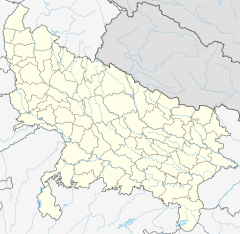Mohammed_Bin_Abdullah_Masjid
Muhammad bin Abdullah Masjid
Mosque being built in Ayodhya, India
Muhammad Bin Abdullah Masjid or Ayodhya Mosque is being constructed in Dhannipur, Ayodhya district, Uttar Pradesh, at the Supreme Court of India designated site following the verdict related to the Ayodhya dispute case.[2][3]
The construction of the Mosque and associated complex is under the Indo-Islamic Cultural Foundation (IICF) trust.[4][5] The Dhannipur Mosque is almost 22 km away from the Ram Mandir, Ayodhya,[6] the former site of its predecessor, the Babri Masjid.
The construction began on 26 January 2021.[4] The mosque was officially named as Ahmadullah Shah Mosque, as an honour to the leader of Indian Independence war of 1857, Maulavi Ahmadullah Shah, but was later renamed as Muhammad Bin Abdullah Masjid., after the Islamic prophet Muhammad.[7]

